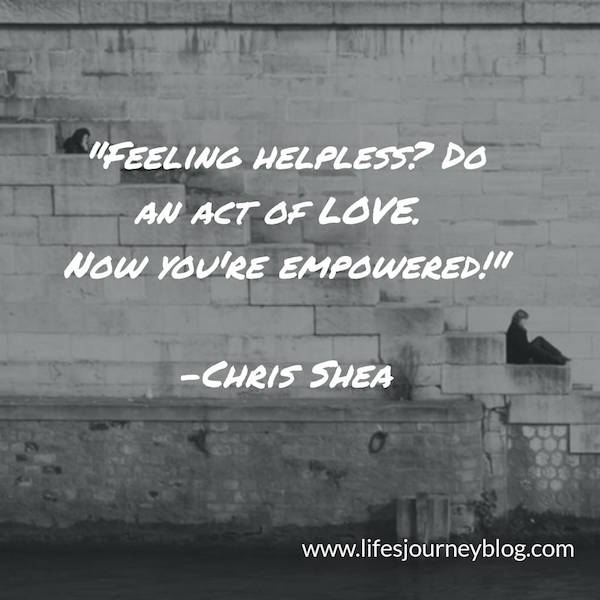
The other evening my cell phone sounded off the breaking news tone.
Upon checking the message I was once again shocked to hear of yet another terrorist attack, this one in France, again.
There have been too many recent news stories about violence—shootings, gangs, terrorist attacks—the list goes on. One of my concerns—or fears, rather—is that over time we will become numb to the violence. The more we hear of these events, the more we will either become used to them, or we will choose to tune them out, thinking that what we don’t know can’t hurt us.
But neither of these scenarios allows us the opportunity to cope with or change the reality of our times.
This isn’t the first time that people have had to live in violent times. A quick read of history reveals times of great violence, hatred and anxiety in the world—greater than what we are now living through. So why do many of us see our present time as especially violent and anxious? Because we ourselves are living through it! This is our present moment. Most of the people who lived through the worst of the last world war are no longer with us, while the majority of the U.S. population was raised either in the “glory days” of the 1950s or are the generation of the post 1980s.
Either way, most of theU.S. population, up until September 11, 2001, didn’t grow up living in fear or anxiety over world events.
The practice of mindfulness shifts my perspective such that I learn from the past so as to prepare for the future. One of the pioneers in the current mindfulness movement, Jon Kabat-Zinn, defines mindfulness as a “means of paying attention in a particular way; on purpose, in the present moment, and nonjudgmentally.” Personally, the two key phrases in the definition that I feel are important to focus on are “on purpose” and “nonjudgmentally.”
To find our inner-peace we need to consciously make the choice to spend 10-20 minutes a day focusing our attention on what is happening around us and in us. Our focus is not to judge what is happening in and around me, but simply to notice it. As we become aware of our surroundings and our inner-self, we will become aware of various options present to us. I believe it’s important for us to know that in the past, compared with the present, there have been worst times, and there have better times. So what do I learn from the past that prepares me for the future? That answer is subjective, and I encourage us to seek our own answer.
Personally, my answer to the question is “action.”
I strive to be an optimistic person, although, I think I end up somewhere in the middle between being an optimist and a pessimist. This middle area I like to refer to as “the realist.” Overall I am basically fine with being a realist as it keeps me grounded. The problem, though, with being a realist, is that there is little room left if I want to make a change to the events in the world.
The optimist sees potential for change, while the realist simply sees what is.
In light of the tensions in the world, what could the optimist say without sounding naïve? What would a blend of a realist with an optimist produce? The optimist views the world from the mindset that every challenge can be overcome, wherein peace and joy always prevail. Even if we can’t imagine how that might be true, the optimist motivates us to strive for it anyways.
For without at least trying, a future full of hope will never be realized.
The joint dialogue of the optimist with the realist would take into account the difficult realities of the situations we face, yet be devoid of naïve “answers.” In place of answers we will feel a sense of hope; a hope fulfilled through practical tasks.
Here are my action steps for mindful living during these anxious times:
1. We aren’t alone.
The struggles in coping with a world in turmoil is not yours nor mine to struggle with by ourselves. Seek out others who feel the same as you and, instead of complaining or despairing, work together on practical solutions to the problems.
2. Step away from the victim mentality.
A victim is a person who suffers as a result of events happening to them for which they are powerless to control. You may say that according to that definition we are victims of what is happening in the world! But if we change our perspective on how we define “world,” not meaning the entire globe, rather, defining my world as consisting of my local community. In this way we can create reasonable expectations. Reasonable expectations allow us to actually do something resulting in our expected change. For example, it is unreasonable to make our goal that of world peace, but a goal of creating a peaceful home, work, or local community is a reasonable goal.
3. Empower yourself and others.
Educate yourself about the struggles and solutions tried in the past. Learn what worked and what didn’t work, figuring out why it didn’t work and what you may do different to make it now work. Find and obtain the resources needed to carry out your goal. Our ability to work with others to find solutions to problems removes the label of “victim” and replaces it with “survivor.” Although we need to be educated about the issues, it is also important to keep a balance, allowing for some news-free periods during the day.
4. Regain your power.
Once we realize that we are not powerless, our desire to implement change brings about a renewed strength and optimism. Recognize the power and strength that you individually, and you as a group, have, finding creative ways of using your power for the good. Do not let the power itself take over, for hubris makes one feel invincible, while in reality, even though we have power, we will not always make the proper decisions. Knowing how to learn from our mistakes is a sign of strength, for the knowledge gained from the mistake will help you to avoid that, or similar mistakes, in the future.
5. Focus your energy.
As I previously mentioned, our power and abilities are limited, so wisely focus your energy on those tasks which can be completed and not on those tasks you know are impossible for you to complete. No one person, or one group, can do everything.
6. Empathy.
As we learn about the issues affecting our world we begin to realize that many of our problems originate with people not understanding each other. We tend to view the world from our perspective and history, failing to recognize that those with whom we may disagree are also viewing their world from their perspective and history. Finding solutions to problems presupposes that all parties agree on the nature of the problem. Empathy, placing ourselves in the shoes of another, provides us a deeper understanding of the concerns of others. By viewing the world through their eyes we can be better informed and so better prepared to find and carry out solutions. Empathy does not mean I agree with another’s opinion, only that I view the other opinion as they view it.
7. Self-care.
To successfully accomplish these tips we risk burnout, so the need for self-care is important. Take time for yourself; keep up bonds with your family and friends; find activities or hobbies which do not relate to the work at hand; spend time in daily meditation and quiet to focus yourself.
I do not propose these steps as absolute solutions to the problems of the world, but as guides to keep us grounded in reality, while still passionate to make a difference. If you can accomplish bringing peace to your world, that peace will spread. Find what is yours to do, and go for it!
Author: Christopher Shea
Photo: via the author
Editors: Renée Picard; Emily Bartran
 Share on bsky
Share on bsky





Read 10 comments and reply